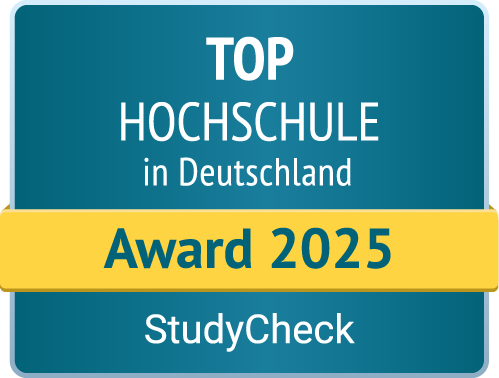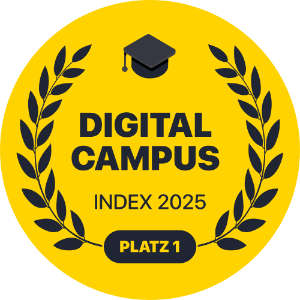Faculty of Media
Media effects
and media psychology (MUM)

Study overview
The Master's programme "Media Effects and Media Psychology" (MUM) deals with psychological approaches to explaining media use and media effects.
Media determine our lives centrally and comprehensively: from getting up to going to bed, in the world of learning and work as well as in leisure and family life alike. Media satisfy our elementary needs: from information and entertainment to communication and social-emotional identification. Due to their complex impact potential, media offers and messages not only have a central individual psychological relevance, but also an enormous social significance and political dimension.
This is where the highly topical approach of the study programme "Media Effects and Media Psychology" becomes apparent, which has an equally exciting and important field as its central study content. This was also recently emphasised by the German Psychological Society: "In our modern information and communication society, the need for psychological approaches to explain media use and media effects has grown enormously. Psychological theory formation and research are centrally required." The degree programme wants to meet this demand with its dedicated research profile. This orientation is also reflected in the curriculum with several modules.

| Short form | MUM |
| Type of study | Full time |
| Standard period of study | 3 semester |
| Award | Master of Science (M.Sc.) |
| Start of studies | Winter semester |
| Admission restricstions | specific |
| Lecture location | Ansbach |
| Language of instruction | German |
| Course management | Prof. Dr. habil. Marion Händel Prof. Dr. Markus Paul |
| Student advisory service | Prof. Dr. habil. Marion Händel |
| Student Services | studierendenservice.mum(at)hs-ansbach.de |
In the degree programme, students learn to explain the many levels of media effects from a psychological perspective. A wide range of highly topical contexts is covered. For example, students acquire sound knowledge about the psychological processes that ensure that films are experienced as exciting, that advertising and campaigns influence our consumer behaviour and that posts in social media can lead to political polarisation.
Current studies such as the JIM-study or the AK-study show the enormous importance of a competent handling of media, their challenges and dangers in the digital age. Therefore, in addition to the many levels of media effects, the study programme also focuses on the question of how all members of society, especially children and young people, can be supported in the competent and reflective use of media.
Students are enabled to apply the acquired knowledge in the analysis as well as the target group-oriented conception of media content and learn methodological skills to independently scientifically investigate media effects and media use.

Admission requirements
Applicants with a successfully completed university degree (minimum grade 2.3) in a relevant degree programme are eligible for admission. Psychology, education, journalism or journalism studies or media and communication studies at a German university with at least 210 ECTS credit points or an equivalent domestic or foreign degree are considered relevant.
Focal points in the study programme
- Basics of Psychology
- Questions of media psychology
- Media reception and media effects
- Media education
- Media and society
- Empirical research methods
- Conception and implementation of independent empirical research projects
Study structure
Competences of our graduates
- Knowledge of human thinking, feeling and experience as well as the reception and processing of information and messages conveyed by the media and their manifold social implications.
- Ability to describe, analyse and evaluate the effects of media content.
- Ability to advise different target groups with regard to the use of media and to train them in the reflective use of media and media content
- Competence to design, develop and implement media messages and offers with regard to intended functions and user-friendliness.
- competence to plan and innovatively develop media offers for specific target groups
- Methodological confidence to independently conceptualise and implement an empirical study
Possible occupational fields
- Marketing
- Media development
- Media Education
- Media Economics
- Corporate Communications
- Advertising industry
- Scientific research
- Science Communication
Staff

Prof. Dr. habil. Marion Händel
Studiengangsleitung Medienwirkungen und Medienpsychologie (MUM)
Prof. Dr. habil. Marion Händel

Studiengangsleitung Medienwirkungen und Medienpsychologie (MUM)
Funktion
- Studiengangsleitung Medienwirkungen und Medienpsychologie (MUM)
- Studienfachberatung Medienwirkungen und Medienpsychologie (MUM)
- Forschungsprofessur „Digitale Kommunikation verstehen und innovieren“ (seit SS 23)
- Editorial Board Member Metacognition and Learning
Lehrgebiete
- Medienpsychologie
- Medienpädagogik
- Werbewirkung- und Persuasionsforschung
- Quantitative Methoden
Vita
- Studium des Lehramts an Gymnasien mit den Fächern Mathematik und Biologie an der Universität Ulm (2001–2006), abgeschlossen mit dem 1. Staatsexamen
- Promotionsstudium (2009 Promotion zum Dr. rer. nat.) im DFG-geförderten Graduiertenkolleg „nwu-essen – Naturwissenschaftlicher Unterricht“ an der Universität Duisburg-Essen (2007–2009); währenddessen Forschungsaufenthalt an der Simon Fraser University in Vancouver, Kanada
- Mitarbeit im Nationalen Bildungspanel (NEPS) in Bamberg (2009-2011), am Lehrstuhl für Pädagogische Psychologie und Exzellenzforschung an der Universität Erlangen-Nürnberg (2011-2022) sowie am Lehrstuhl für Psychologie der Universität Augsburg (2022)
- 2018 Habilitation und Erteilung der Venia Legendi im Fachgebiet „Psychologie mit Schwerpunkt Empirische Bildungsforschung“ an der Universität Erlangen-Nürnberg
- Vertretung der W3-Professur Digitale Bildung in der Schule an der Carl von Ossietzky Universität Oldenburg im Wintersemester 2021/22; Listenplätze an der Universität Zürich (UZH) in der Schweiz (2022, Gymnasialpädagogik und Lehr- und Lernforschung) sowie der Universität Augsburg (2020, Methoden der empirischen Unterrichtsforschung)
- Seit September 2022 Professorin für Medienpsychologie mit den Schwerpunkten Medienpädagogik und Rezeptionsforschung an der Hochschule Ansbach
Forschungsinteressen
- Kommunikation und Kollaboration in Videokonferenzen
- Künstliche Intelligenz im Bildungsbereich
- Metakognition, Selbstregulation und selbstreguliertes Lernen, insb. auch im digitalen Kontext
Bei Interesse an Abschlussarbeiten zu diesen Themenbereichen kontaktieren Sie mich gerne per E-Mail.
Ausgewählte Publikationen (vollständiges Verzeichnis: https://orcid.org/0000-0002-3069-5582)
Händel, M., Bedenlier, S., Gläser-Zikuda, M., Kammerl, R., Kopp, K. & Ziegler, A. (2022). The webcam and student engagement in synchronous online learning: Visually or verbally? Education and Information Technologies. https://doi.org/10.1007/s10639-022-11050-3
Naujoks, N., Harder, B. & Händel, M. (2022). Testing pays off twice: Potentials of practice tests and feedback regarding exam performance and judgment accuracy. Metacognition and Learning. https://doi.org/10.1007/s11409-022-09295-x
Bond, M., Bedenlier, S., Marín, V. I. & Händel, M. (2021). Emergency remote teaching in higher education: Mapping the first global online semester. International Journal of Educational Technology in Higher Education, 50. https://doi.org/10.1186/s41239-021-00282-x
Händel, M., Harder, B. & Dresel, M. (2020). Enhanced monitoring accuracy and test performance: Incremental effects of judgment training over and above repeated testing. Learning and Instruction, 65. https://doi.org/10.1016/j.learninstruc.2019.101245
Händel, M., Stephan, M., Gläser-Zikuda, M., Kopp, K., Bedenlier, S. & Ziegler, A. (2020). Digital readiness and its effects on higher education student socio-emotional perceptions in the context of COVID-19 pandemic. Journal of Research on Technology in Education. https://doi.org/10.1080/15391523.2020.1846147
Ausgewählte Forschungs-, Lehr- und Kooperationsprojekte
- 2021: Konsiliarpartnerin im OPEN vhb Projekt „Selbstreguliertes Lernen als Wegbereiter für das Studium“ der Universität Bamberg
- 2021: Methodenberatung bei der Lehrevaluation im Rahmen des Projekts Zukunftskompetenzen für Transformation und nachhaltiges Wirtschaften der Technischen Hochschule Nürnberg, gefördert von der Stiftung Innovation und Zukunft
- 2020-2023: Mitglied im DFG network „The role of self-regulated learning in the process of educational innovation“ (SeReNe)
- 2020-2022: Mitarbeit bei der Evaluation der „ILAE Academy“, einem virtuellen Campus zur Weiterbildung medizinischen Fachpersonals (geleitet vom Universitätsklinikum Erlangen)
- Seit 2020: Projektleitung des FAU-E-Learning Monitoring, einer institutionellen Längsschnittstudie zum Umgang Studierender mit der Umstellung auf digitale Hochschullehre
- Seit 2020: Mitarbeit an systematischen Reviews im Bereich des Emergency Remote Teaching sowie Educational Technology (interdisziplinäre und internationale Kooperationen)
- 2018-2020: Leitung eines Projekts zur Analyse von Portfolio-Einträgen und Ableitung von Handlungsempfehlungen für den Einsatz von E-Portfolios in der Hochschullehre (gefördert von der STAEDTLER-Stiftung)
- 2018-2019: Leitung eines Projekts zur Bedeutsamkeit (meta-)metakognitiver Leistungseinschätzungen für das selbstregulierte Lernen (gefördert von der Emerging Talents Initiative – ETI der Universität Erlangen-Nürnberg)
Auszeichnungen
- Top 10 COVID “Good Reads” 2021; National Institute for Digital Learning, NIDL, Ireland
- Waxmann Posterpreis der 7. Jahrestagung der Gesellschaft für Empirische Bildungsforschung (GEBF) in Köln 2019

Prof. Dr. Markus Paul
Studiengangsleitung Medienwirkungen und Medienpsychologie (MUM)
Prof. Dr. Markus Paul

Studiengangsleitung Medienwirkungen und Medienpsychologie (MUM)
Funktionen:
- Vizepräsident
- Professor Ressortjournalismus (RJO)
- Professor Internationales Management (BIM)
- Professor Multimediale Information und Kommunikation (MIK)
- Professor Multimediale Medienproduktion (MMP)
- Stellvertretender Vorsitzender Prüfungskommission Multimediale Information und Kommunikation (MIK)
- Studiengangsleitung Medienwirkungen und Medienpsychologie (MUM)
- Stellvertretender Vorsitzender Prüfungskommission Ressortjournalismus (RJO)
- Leiter Projekt Inklusive Hochschule
- Hochschulsportbeauftragter
Lehrgebiete:
- Crossmedialer Journalismus
- Medienethik
- Sport-Journalismus
- Medien-Wirkungsforschung
Vita:
- Prof. Dr. Markus Paul war zuletzt Mitglied der Chefredaktion der Nürnberger Zeitung. Dort leitete er den Newsdesk und war zuständig für das zentrale Nachrichtenmanagement sowie die Blattplanung und -aufmachung. Zudem betreute er die Jahresrückblicke und publizistische Sonderprojekte. Zuvor war er nach seinem Redaktionsvolontariat lange Jahre Redakteur im Politikressort der Nürnberger Zeitung.
- Markus Paul hat Geschichte und Germanistik an der Friedrich-Alexander-Universität Erlangen-Nürnberg studiert (Magister Artium). Nach seinem Studium promovierte er in Neuerer Deutscher Literaturwissenschaft und forschte und lehrte als wissenschaftlicher Mitarbeit an der Universität Erlangen am Lehrstuhl Prof. Dr. Verweyen.
- Seit März 2012 lehrt er als Professor an der Hochschule Ansbach im Studiengang Ressortjournalismus.
- Er ist zudem Rezensent der Online-Zeitschrift "r:k:m - rezensionen: kommunikation: medien" (http://www.rkm-journal.de/archives/16183).

Prof. Dr. Roman Rusch
Professor Medienwirkungen und Medienpsychologie (MUM)
Prof. Dr. Roman Rusch

Professor Medienwirkungen und Medienpsychologie (MUM)
Funktionen:
- Professor Digital Learning (DL)
- Professor Medienwirkungen und Medienpsychologie (MUM)
- Professor Public Relations und Unternehmenskommunikation (PUK)
- Professor Ressortjournalismus (RJO)
- Vorsitzender Prüfungskommission Ressortjournalismus (RJO)

Prof. Dr. Julia Sasse
Vorsitzende Prüfungskommission Medienwirkungen und Medienpsychologie (MUM)
Prof. Dr. Julia Sasse

Vorsitzende Prüfungskommission Medienwirkungen und Medienpsychologie (MUM)
Funktion
- Studiendekanin der Fakultät Medien
- Vorsitzende Prüfungskommission Medienwirkungen und Medienpsychologie (MUM)
Lehrgebiete
- Sozialpsychologie
- Medienpsychologie
- Medien und Gesellschaft
- Medieninnovationen und ihre Wirkungen
- Forschungsprojekt
Vita
Psychologiestudium an der Heinrich-Heine-Universität Düsseldorf von 2007 bis 2012 (Bachelor- und Masterabschluss)
Promotionsstudium an der Rijksuniversiteit Groningen (Niederlande) von 2013 bis 2017 (Promotion im November 2017) mit Forschungsaufenthalt am Interdisciplinary Center Herzliya (Israel; jetzt Reichman University)
Senior Research Fellow am Max-Planck-Institut zur Erforschung von Gemeinschaftsgütern von 2017 bis 2022
Wissenschaftliche Mitarbeiterin am Chair of Cyber Trust an der Technischen Universität München von 2022 bis 2023, seit Mai 2023 Gastwissenschaftlerin
Seit 2020 assoziierte Forscherin am TUM Institute for Ethics in Artificial Intelligence über das Drittmittelprojekt „Personalized AI-based Interventions Against Online Norm Violations: Behavioral Effects and Ethical Implications“
Seit März 2023 Professorin im Studiengang Medienwirkungen und Medienpsychologie
Ausgewählte Publikationen
Sasse, J., Cypris, N., & Baumert, A. (2023). Online Moral Courage. In C. Cohrs, N. Knab, & G. Sommer (Hrsg.), Handbuch Friedenspsychologie 57. https://doi.org/10.17192/es2022.0074
Sasse, J., & Grossklags, J. (in press). Breaking the Silence: Investigating Which Types of Moderation Reduce Negative Effects of Sexist Social Media Content. Proceedings of the ACM on Human- Computer Interaction.
Sasse, J., Halmburger, A., & Baumert, A. (2020). The functions of anger in moral courage—Insights from a behavioral study. Emotion. https://doi.org/10.1037/emo0000906
Sasse, J., Li, M., & Baumert, A. (2022). How prosocial is moral courage? Current Opinion in Psychology, 44, 146–150. https://doi.org/10.1016/j.copsyc.2021.09.004
Sasse, J., van Breen, J. A., Spears, R., & Gordijn, E. H. (2021). The Rocky Road from Experience to Expression of Emotions—Women’s Anger About Sexism. Affective Science, 2(4), 414–426. https://doi.org/10.1007/s42761-021-00081-7
Forschungsinteressen
- Zivilcourage in online und offline-Kontexten
- Effektivität und Akzeptanz von Maßnahmen (wie z.B. Gegenrede, Löschung) gegen schädigendes online-Verhalten (wie z.B. Hatespeech, Sexismus), sowohl durch Personen als auch automatisiert
- Kognitionen und Emotionen in Intergruppenkonflikten
Bei Interesse an Abschlussarbeiten, die grob in diese Interessensbereiche fallen, so kontaktieren Sie mich gerne per E-Mail.

Ralph-Peter Kappestein
Leiter Studierendenservice der School of Business and Technology (SBT)
0981 4877-143 BHS 3.02 (Brauhausstraße 15, 91522 Ansbach) nach Vereinbarung ralph-peter.kappestein vCard
Ralph-Peter Kappestein

0981 4877-143
BHS 3.02 (Brauhausstraße 15, 91522 Ansbach)
nach Vereinbarung
ralph-peter.kappestein
vCard
Leiter Studierendenservice der School of Business and Technology (SBT)
Funktionen:
- Leiter Studierendenservice der School of Business and Technology (SBT)

Samina Kroemer
Fakultätsassistentin Medien
0981 4877-419 92.2.51 nach Vereinbarung samina.kroemer vCard
Samina Kroemer

Fakultätsassistentin Medien
Funktionen:
- Fakultätsassistentin Medien
Tätigkeitsfelder
- Medienwirkungen und Medienpsychologie (MUM)
- Public Relations und Unternehmenskommunikation (PUK)
© 2025 Hochschule Ansbach




